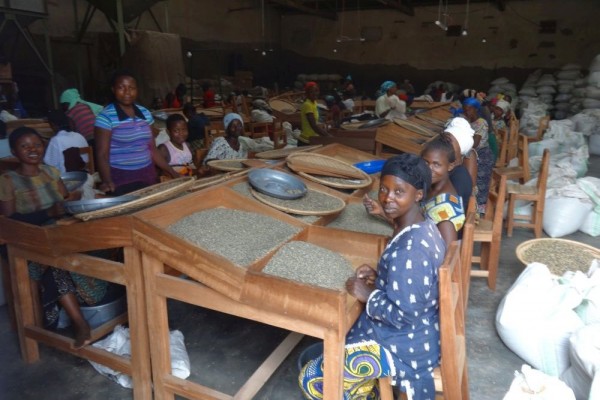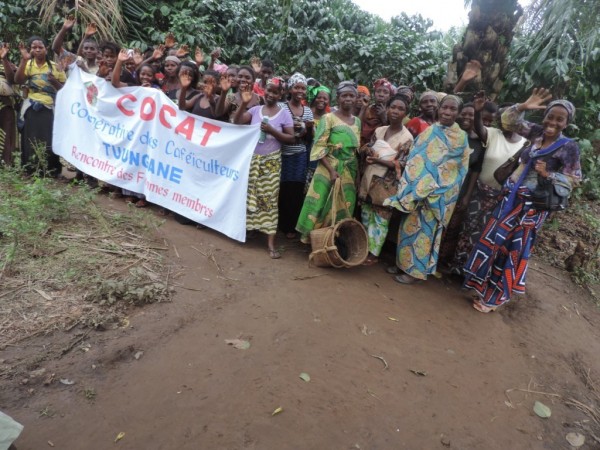Change can be difficult to perceive from 8,300 miles away, but the $35,000 raised at last year’s Java Jog for a Cause — held in conjunction with the SCAA Event in Seattle — has immediately improved the daily lives of hundreds of women in coffee and helped open new doors for the Democratic Republic of Congo coffee industry as a whole.
As the organizers of this year’s Java Jog prepare for the third annual event in Seattle, one that will benefit women in coffee in Ethiopia, we asked Java Jog co-founder Beth Ann Caspersen for some specifics about how the 2014 investments played out. (It should be noted that Roast Magazine is again this year a proud sponsor of Java Jog.)
For the sake of transparency and with an eye toward potential for Ethiopia in 2015, Casperson provides the following:
Where did the Money Go in 2014?
by Beth Ann Caspersen
We are a small volunteer organization that has provided financial support to women in coffee through capacity building, medical support and coffee processing equipment. Java Jog for a Cause raised $35,000 in 2014 for women in the DRC and while project execution can be difficult in a country like the DRC, we can proudly report on the projects that were funded and demonstrate how we are, thanks to all of our supporters, succeeding in helping women in coffee. Here is a snapshot of how the beneficiaries of this money put it to good use:
Virunga Coffee Company: $3,500
This grant built new tables and stools for sorting that are more ergonomically correct and comfortable. In addition, a solar lighting system was installed, enabling the women to see better, especially during the rainy season.
Virunga has worked diligently to implement the funding and started out by building two different kinds of sorting tables as ‘model’ tables to try out for a short period of time. Once they determined which table was better, based on workflow and feedback from the women, local woodworkers constructed 16 tables. Each table can accommodate four women sorting coffee, for a total of 64 women (only a modest 25 table spots were initially requested). The dimensions are designed to allow enough space for the handling of coffee with comfortable body positions.
Eastern Congo Initiative: $11,500
“Coffee has the potential to be an important driver of economic development for local communities surrounding Lake Kivu, in the eastern DRC,” says Harper McConnell of the Eastern Congo Initiative. “While women play an important role in coffee production in DRC, few women are currently implicated in decision-making surrounding the sale, management and marketing of coffee. This is a critical challenge to the socioeconomic development of the region and an obstacle to gender equality.”
Partnering with the Tufaidike cooperative in the Minova region, ECI is working to integrate women into the cooperative’s decision-making structures. To support this objective, 23 sub-group leaders within Tufaidike will travel with the cooperative management team to Rwanda between March 31 and April 1 for a learning visit to two prominent coffee cooperatives, Huye and Simbi. Eleven of the 23 traveling sub-group leaders will be women. The Tufaidike representatives will build a stronger understanding of coffee processing in washing stations, and focus on the importance and benefits of effective and inclusive cooperative governance.
Following the visit to Huye and Simbi, these cooperative members will be hosted by the Rwanda Trading Company in Kigali on April 2 to learn about the coffee cupping process, as well as farming practices that can improve quality.
International Women’s Coffee Alliance: D.R. Congo Chapter: $20,000
What happens if you harvest great quality coffee but you don’t have anywhere to process it? This is the situation that many farmers face in the DRC and it is one of the many reasons we chose to fund the the International Women’s Coffee Alliance project to support women coffee farmers in Lubarika village, Ndolera village and Uvira Territory to build their own coffee washing station. The $20,000 grant, along with additional outside funding provided by Food for the Hungry USA, has allowed for a range or equipment purchases for processing infrastructure.
Chantal Binwa, president of both the Tuungane Coffee Growers Cooperative and and the IWCA’s DRC chapter, happily reports that the project is nearing completion. They have finished building the water filter for the washing of coffee; the water reservoir of the washing station; the shed for cherry reception; a sink for cherry reception; the shed for cherry machinery; fermentation sinks; a coffee grader and washing canal; sinks to soak coffee; and cherry machinery installation.
These updates to the washing station will allow for the processing of approximately 450 kilos of cherry during the harvest season, from coffees grown by some 1,500 female smallholder farmers from the Uvira, Walungu and Fizi territories. Just as important, it will allow the women of the cooperative to further their position in society through economic empowerment.
Java Jog 2015
The $35,000 raised in 2014 allowed for some significant steps in the empowerment of women in the DRC and the development of the coffee segment’s industry as a whole. We humbly ask for your support in 2015, as each contribution from each jogger represents more and bigger steps toward positive change in the supply structure, and improved opportunities for women that benefit everyone involved.
(Beth Ann Caspersen is one of the co-founders of Java Jog for a Cause. She is the Quality Control Manger for the coffee importer and roaster Equal Exchange in West Bridgewater, Mass., the founder of the Congo Coffee Project, a Q Licensed Instructor and member of the SCAA Coffee Tasters Committee. You can email her with your thoughts and questions: [email protected])
Nick Brown
Nick Brown is the editor of Daily Coffee News by Roast Magazine.








Comment